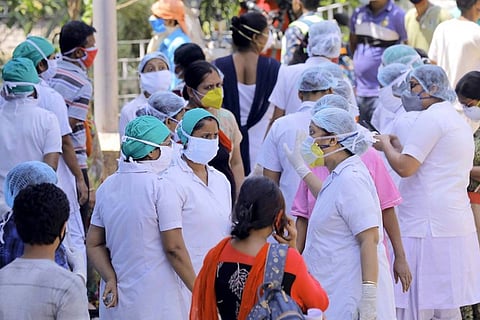

Sunday, December 6, was the last day for the general public and stakeholders to send their comments about the draft National Nursing and Midwifery Commission Bill, 2020, proposed by the Union Ministry of Health and Family Welfare. The bill, if finalised, would replace the Indian Nursing Council with the National Nursing and Midwifery Commission. Several nursing associations and individuals in Kerala have written to the government on why they find the new bill problematic.
"There are many issues, starting with how members of the (national) Commission shall be selected. If the bill is finalised, there will be no election process anymore to choose the members. They will instead be nominated by the Union Government,” says T Subramanian, General Secretary, Kerala Government Nurses Association (KGNA).
The new commission will “frame policies and regulate standards for the governance of nursing and midwifery education and training” and research and other practices.
Malayalis account for 60% of nurses in India. It stands to lose much when this - yet another - over-centralising draft law for nursing is enacted. Hope Kerala would voice its concerns. Tomorrow is the last day to file comments @shailajateacher https://t.co/iqzc9EiYDL
— N.S. Madhavan (@NSMlive) December 5, 2020
With the commission replacing the council at the national level, the state level councils will also be defunct. A new state commission is proposed to be formed within a year. “The federal system will be entirely affected. All the members of the state commission that will be formed to replace the state council – will also be nominated by the union government,” says Usha Devi, president of Kerala Nursing Council.
Among the 20 to 22 lakh nurses in the country, 12 lakh are from Kerala, she says. Most of them work outside of the state or the country. “How will the new bill affect all of them is a huge question,” Usha adds.
The big question on salaries of nurses – something they have held many protests for – is not addressed either, Usha says. “Neither do such details as the amount of time they will need to work to find a mention in the draft,” she adds.
In the new commission, members will be categorised into six zones, each zone comprising four to five states. Two members from every zone will be selected. And membership will be on a rotation basis of two years each for a member from a zone, which means that a representative from Kerala will have to wait several years for their turn, Subramanian says.
Read draft #Nursing & #Midwifery commission bill 2020, send your response to nnmcbill-mohfw@nic.in TODAY!! Read my recommendations here https://t.co/cdbFzFm8Hz @krishnansuneeta @MedhaGandhi @world_midwives @HealthEquityInd @bangalorebirth @BirthIndiaOrg @WRAIndia @jsa_india pic.twitter.com/0cUxxc3cty
— Kaveri Mayra (@Mayra_K11) December 5, 2020
Nurses from a number of institutes recognised by the union government will be members of the commission. “This includes only one institute from Kerala – the Sree Chitra Tirunal Institute for Medical Sciences & Technology – and three in all from South India,” Subramanian says.
Another problem raised by various associations is the inclusion of a single entrance and exit exam for nursing. Subramanian says that the entrance exam which had earlier been in practice until about 10 years ago was later stopped considering the difficulties faced by financially poorer students in attending coaching classes to prepare for such exams. “Instead the marks scored in plus 2 level exams were considered. Now if they are bringing back the entrance exam, it will again put the poorer students at a disadvantage. Such a move will only help the coaching institutes,” Subramanian says.
The poor can’t compete in such a system, Usha agrees.
In addition there is the exit test which the student has to take at the end of the nursing course. Only on passing the exit exam can a student register in a nursing council, before beginning to work as a nurse. Details on who conducts the exit exam, how many times a student can take it and so on are not made clear in the draft bill, Subramanian says.
He also cites as problematic the transfer of power to designated agencies to inspect nursing colleges and rate institutes. The Kerala Nursing Council has so far kept all this in check, and new agencies being designated may lead to corruption, Subramanian fears.
However, the United Nurses Association (UNA), a body for nurses in Kerala, welcomes the formation of a national commission, UNA president Shoby Joseph says. “We have been asking for such a united commission to be formed across the country. This will make it easy for nurses going from one state to another. In the existing system, they need to take membership in the nursing council of the state they move to and cancel the one from the state they are leaving. It can be a tedious process. But with a national commission, that will be taken care of. However, we’d like to get some clarity on the salary and job description and other details of nurses, which are not addressed in the draft bill. We have written to the government about it,” says Shoby.